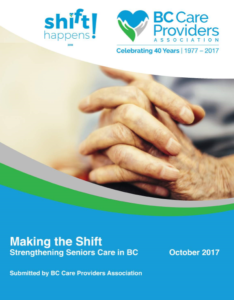Canada’s senior population is surging, and a strained health system makes it challenging to appropriately meet the needs of the chronically ill and frail elderly, and those with dementia. So what practical steps can the Government of British Columbia make that it can also afford?
BC Care Providers Association proposes several initiatives in its latest submission to the Select Standing Committee on Finance and Government Services—”Making the Shift: Strengthening Seniors Care in BC”.

BC’s senior population will account for 24 to 27 per cent of the population by 2038, and the demand for health care services by seniors is expected to increase by 41 per cent over the next 10 years from population growth and aging alone.
Exploring alternative models to create and sustain a health system that is less acute-oriented and better designed can address the needs of this aging population.
Earlier this week, BCCPA submitted its annual submission to the bi-partisan committee, which advises the Minister of Finance each year with around 100 recommendations. In the Standing Committee’s November 2016 report, BCCPA’s proposals became recommendations 1, 2, and 3 out of a total of 102.
The 2018 submission puts forward new strategies while reiterating several positions discussed in previous BCCPA policy papers, such as increasing supporting a renewed health human resource strategy, and providing supports to improve quality of life for seniors, both in the community and in residential care.
Recommendations outlined in this year’s submission include new investments in infrastructure to replace aging care homes; addressing HHR shortages facing the continuing care sector; establishing a new Seniors Quality of Life Fund—among several others.

“Strengthening the workforce, improving quality of life for seniors, and fostering innovation in the continuing care sector are major issues that deserve the focus and the resources of the BC government,” says BCCPA CEO Daniel Fontaine.
“We look forward to working with the government to build on a system that will deliver exceptional care to our seniors.”
The four key areas outlined below provided the basis for the 14 recommendations that were put forward in the submission:
Investing in Infrastructure
- Establish a new Residential Care Infrastructure Fund (RCIF) of $150 million over three years to support the immediate renewal and replacement of older residential care homes, and support investments in smaller infrastructure projects such as sprinkler and ceiling lift installations, security, automated medication management and data collection systems.
Investing in People
- $25 million Continuing Care Health Human Resource (CCHHR) Fund to be invested over 5 years to address the chronic labour shortages currently facing the continuing care sector including up to half of the funding for education, training and resources for staff to provide improved dementia care.
Investing in Quality of Life
- Establish a new Seniors Quality of Life Fund (SQLF) to support quality of life for seniors in residential care and in the community. Along with providing services to community the SQLF would provide up to $100 per month per senior living in a non-government operated residential care setting (total approximately $25 million per year, including up to $3 million for a province-wide quality initiative coordinated by BCCPA).
- $50 million in annual funding to increase minimum home care and support visit times from 15 to at least 30 minutes as outlined in a new provincial guideline.
Investing in Innovation
- Allocate up to $2M per year to launch a new Care Credits program which provides seniors [or the family members that care for them] the option to select the service provider of their choice.
- Invest up to $25M per year over the next four years to support the introduction and/or expansion of the Care Hub concept throughout B.C.
- $20 million in annual funding over four years to support the adoption of new home health models province-wide to allow seniors to remain at home longer as well as reducing alternate level of care (ALC) days and improving overall quality care by focusing on several areas particularly models that: advance the hospital at home model; better integrate home health and long term care; better integrate home health and acute care; and support greater end of life care at home.
BCCPA CEO Daniel Fontaine and VP, Communications & Stakeholder Relations, Mike Klassen, also met with BC NDP, BC Liberal and BC Green Caucus members in Victoria to discuss strategies outlined in the submission to improve seniors’ care in B.C.





